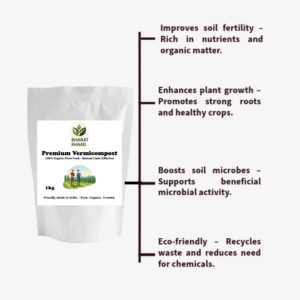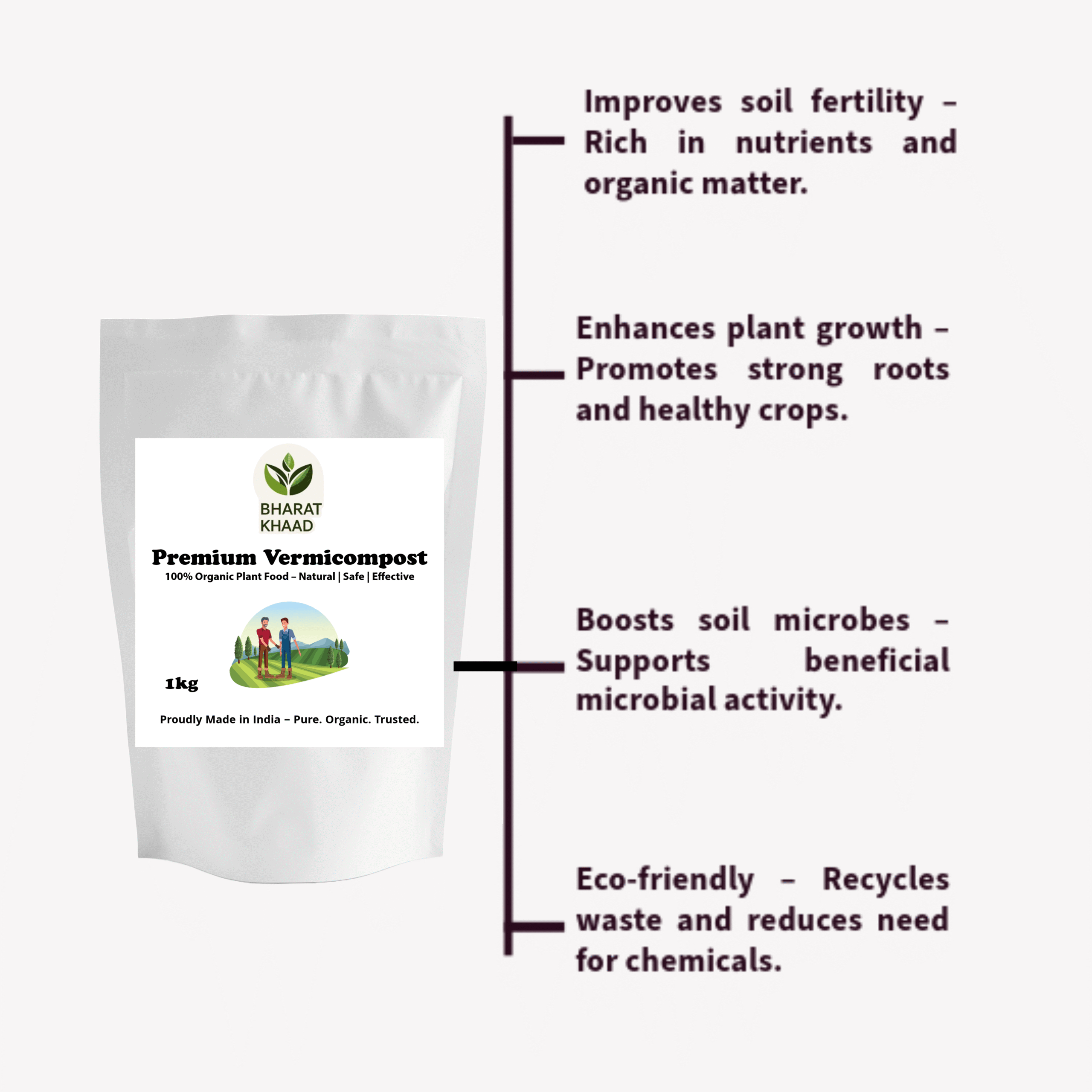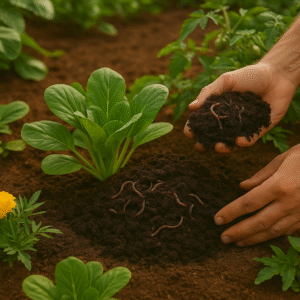Premium Buy Organic Vermicompost for Healthy Plants
🌿 Enrich Your Soil Naturally with Premium Buy Organic Vermicompost
🌱 100% Organic Compost for Healthier, Happier Plants
In the field of sustainable agriculture and environmentally friendly gardening, vermicompost has emerged as a game changer.Known as the “black gold” of gardening, vermicompost for plants is not just a fertilizer—it is a complete organic solution that improves soil fertility, stimulates plant growth, and strengthens immunity against diseases. This article explores everything you need to know about using vermicompost to enhance plant health naturally and effectively. Give your plants the nutrition they truly deserve with our high-quality Buy Organic Vermicompost, made from the natural digestion process of earthworms. This dark, crumbly compost is high in humus, critical nutrients, and beneficial bacteria, which promote root development and improve soil texture. Whether you’re growing veggies, fruits, flowers, or houseplants, vermicompost guarantees healthy, disease-resistant plants from seedling to harvest.
Keywords: organic compost, vermicompost for plants, natural fertilizer
What is Vermicompost?
Earthworms break down biodegradable garbage to form vermicompost, which is an organic fertiliser. These worms eat organic materials like kitchen scraps, crop residues, and cow dung, and excrete nutrient-rich castings.The end product is a dark, crumbly, odorless compost known as worm castings or vermicast. It’s packed with plant nutrients and beneficial microbes that improve soil health and enhance plant growth.Earthworms like Eisenia fetida (red wigglers) are commonly used in vermicomposting because of their high digestion and reproduction rate. The process takes about 45–60 days, depending on conditions like moisture, temperature, and feed material.
Nutrient Profile of Vermicompost
A major reason why vermicompost is preferred for plants lies in its high nutrient content. On average, good-quality vermicompost contains:
Nitrogen (N): 1.5% to 2.0% – Essential for leafy growth and chlorophyll formation.
Phosphorus (P): 0.9% to 1.5% – Encourages root development and flower production.
Potassium (K): 1.2% to 1.8% – Strengthens plant cell walls and improves disease resistance.
Micronutrients – Calcium, magnesium, zinc, copper, iron, and manganese.
Beneficial microorganisms – Such as nitrogen-fixing bacteria and mycorrhizae fungi.
Benefits of Vermicompost for Plants
1. Enhances Soil Structure and Aeration
Vermicompost improves soil texture, increasing its water-holding capacity and aeration. This creates a better root environment, particularly for potted plants and dense clay soils.
2. Promotes Rapid and Healthy Growth
The humic acids and plant growth regulators present in vermicompost act as natural stimulants, encouraging faster germination, healthier roots, and vigorous foliage development.

3. Strengthens Disease Resistance
Plants grown in vermicompost-enriched soil have shown stronger immunity against common fungal and bacterial infections, including root rot, damping off, and blight.
4. Safe for All Plants
Vermicompost, unlike artificial fertilisers, is nontoxic and pH balanced. It can be used for flowering plants, vegetables, herbs, indoor foliage, fruit trees, and even succulents without risk of burning roots.
5. Eco-Friendly and Sustainable
As a completely organic fertilizer, vermicompost reduces the reliance on synthetic fertilizers and repurposes organic waste—making it a sustainable choice for both home gardeners and organic farmers.
How to Use Vermicompost for Plants
1. Soil Amendment Before Planting
Mix 2 to 3 kg of vermicompost with every 10 kg of garden soil while preparing your pots, beds, or grow bags. This ensures nutrients are readily available from the start.
2. Top Dressing for Established Plants
Apply 100 to 200 grams of vermicompost around the base of plants every 20–30 days, and gently rake it into the topsoil. Water the plant immediately afterward for better absorption.
3. In Potting Mixes
For indoor plants, use a mix of:
40% garden soil
30% vermicompost
30% cocopeat or sand
This combination supports drainage, aeration, and long-term nutrient supply.
4. Seed Germination and Transplanting
When sowing seeds or transplanting saplings, add a small handful of vermicompost directly into the pit or container to promote root establishment and reduce transplant shock.
Organic compost
Organic compost is a nutrient-rich, natural fertilizer created through the process of decomposing organic matter such as kitchen scraps, garden waste, animal manure, and crop residues. Beneficial microbes carry out the decomposition, converting the material into a black, crumbly substance rich in important nutrients such as nitrogen, phosphorus, and potassium.When added to soil, organic compost improves soil fertility by enhancing its nutrient content, moisture retention, and aeration. It also helps maintain a healthy balance of beneficial microbes in the soil, which supports plant growth and resilience against diseases. Unlike synthetic fertilizers, organic compost releases nutrients slowly and sustainably, reducing the risk of chemical runoff and environmental pollution. Using organic compost promotes sustainable agriculture, reduces waste sent to landfills, and encourages natural soil regeneration, making it a vital component for healthy farming and gardening practices.
Best Plants to Use Vermicompost With
Buy Organic Vermicompost is universally beneficial, but some plants respond especially well:
Vegetables: Tomatoes, spinach, brinjal, capsicum, okra, cabbage
Flowers: Roses, marigolds, petunias, hibiscus, zinnias

Best Plants to Use Buy Organic Vermicompost With Fruits: Papaya, guava, banana, mango, lemon
Indoor plants: Money plant, peace lily, snake plant, spider plant
Herbs: Tulsi, coriander, mint, lemongrass, oregano
Vermicompost Application Frequency Guide
| Plant Type | Dosage per Plant | Frequency |
|---|---|---|
| Vegetables | 150–200g | Every 20–25 days |
| Flowering Plants | 100–150g | Monthly |
| Fruit Trees | 1–2 kg | Every 45 days |
| Indoor Plants | 50–100g | Every 30 days |
| Lawn/Grass | 5–10 kg per 100 sq ft | Quarterly |
Precautions When Using Vermicompost
Avoid overuse: Excessive vermicompost can lead to waterlogging due to high moisture retention.
Store properly: Keep it in a cool, dry, shaded place to preserve microbial life.
Ensure it’s matured: Unfinished compost can generate heat and harm roots.
Difference Between Vermicompost and Other Organic Fertilizers
| Feature | Vermicompost | Cow Dung Manure | Compost |
|---|---|---|---|
| Nutrient Density | High | Medium | Medium |
| Odor | Mild/Earthy | Strong | Varies |
| Microbial Activity | Very High | Moderate | Moderate |
| Application Safety | Safe for roots | Risk of burning if fresh | Depends on quality |
| Decomposition Time | Fast (with worms) | Slow | Medium |
Homemade Vermicompost: A Quick Overview
For gardeners looking to make their own vermicompost:
Container: Use a ventilated bin or clay pot.
Bedding Material: Dry leaves, shredded newspaper, cardboard.
Organic Waste: Vegetable peels, fruit scraps, tea leaves.
Add Earthworms: Ideally Eisenia fetida.
Maintain Moisture: Keep the medium moist but not soggy.
Harvest Time: Ready in 45–60 days with dark, crumbly texture.
Where to Buy Quality Vermicompost
Ensure you’re buying authentic, Buy Organic Vermicompost free from chemicals or adulteration. Look for:
Earthy smell, not foul
Dark brown or black color
Presence of worm castings
Branded, certified packaging
Trusted suppliers like BharatKhaad.com offer lab-tested, farm-produced vermicompost ideal for all plant types.
🌾 Boost Yield & Improve Soil Structure Effortlessly
Vermicompost doesn’t just feed your plants — it rejuvenates your soil. Its porous structure improves aeration, water retention, and microbial activity. Regular use leads to increased crop yield, better seed germination, and stronger plant immunity. Suitable for kitchen gardens, farms, pots, and planters, it’s your go-to solution for healthy soil and lush growth — season after season.
Keywords: increase plant yield, improve soil quality, compost for farming
♻️ Eco-Friendly, Odor-Free & Chemical-Free Farming Solution
Our vermicompost is 100% organic, chemical-free, and completely safe for kids, pets, and pollinators. It’s free from foul smells, harmful additives, or synthetic residues, making it perfect for sustainable gardening and certified organic farming. By choosing vermicompost, you support earth-friendly agriculture that protects your soil, your health, and the planet.
Keywords: chemical-free compost, eco-friendly soil additive, sustainable gardening
Also checkout-:
- Top 3 Benefits of Coco Peat | Organic & Eco-Friendly Growing Medium
- Top 10 Indoor Plants – Stylish, Easy, Air-Purifying
- Top 5 Mitti Pots for Healthy Cooking | Eco-Friendly Clay Cookware
- Top 7 Ceramic Pots for Home Décor | Elegant & Durable Planters
- Top 5 Colorful Cemented Pots for Garden & Home
- Top 5 Green Grow Bags for Gardening – Reusable & Eco-Friendly
- Top 10 Decorative Plant Pots – Stylish & Durable Options
- Mustard Cake Fertilizer – 100% Organic Plant Booster for Bigger Blooms
- Vermiwash – 100% Organic Liquid Fertilizer for 2X Plant Growth
- Cold-Pressed Neem Oil – 100% Organic Insect Control for 30+ Pests
- BharatKhaad Organic Bone Powder – 2X Root & Flower Growth Naturally
- Neem Khali – 100% Organic Pest & Soil Solution for Healthier Crops
- Buy Organic Vermicompost – 100% Natural Soil Booster for 3X Growth
- Bharat Bio Gold – 100% Organic Fertilizer for 3X Crop Yield





Reviews
There are no reviews yet.